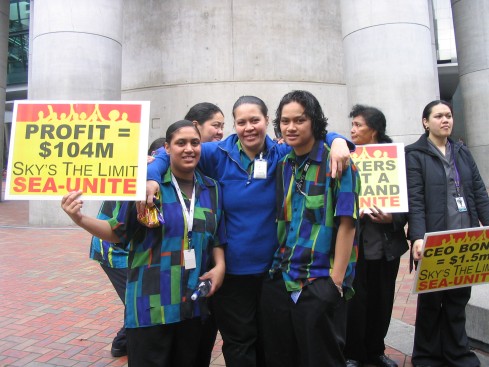 Unite Union sign on front of 300 Queen Street
Unite Union sign on front of 300 Queen Street
(The following history was prepared as part of the contribution by Unite Union to the international fast food workers meeting in New York in early May. Unions officials and workers were fascinated by the story we were able to tell which in many ways was a prequel to the international campaign today.)
All four parts of this series can be downloaded as a single PDF file from here
Part Two
Part Three
Part Four
Extending Unite’s reach
Unite was always looking to ways to bring our members additional benefits. In late 2006, Unite contracted with Te Wananga o Aotearoa – a Maori-led tertiary institution – to offer computer classes for union members. We set up a Unite school in central Auckland and provided classes days and evenings, seven days a week, so our members could attend. A casino worker on a rotating 24-7 shift could enrol and complete a course. For a few years, one of the main buildings in Queen St was named “Unite House” with red flags flying from the roof – much to the consternation of friend and foe alike. Thousands of workers graduated from these courses.
In July 2006, SkyCity casino workers won pay rises of 5-9% after a campaign of two-hour, all-out strikes several times a week combined with rolling strikes by department. The company was taken by surprise at the determination of the SEA-Unite members.

SEA-Unite members join picket in 2006
In late 2006 and 2007, Unite unionised a factory owned by Independent Liquor at the request of some workers. This was a very anti-union employer. Strikes and pickets were needed to get a collective agreement, the first in the company for 20 years. After a while, however, we realised that we were probably getting beyond core business and agreed to allow the Engineers Union which covered workers in other liquor manufacturing plants to take over representation.
Unite also extended its representation with a hotel campaign involving strikes (and occasional lockouts) at a number of hotels in early 2007. The ADT-Armourguard monitoring centre struck on Christmas Eve – the busiest night of the year to secure an improved offer for a renewed collective agreement.
Continue reading →















